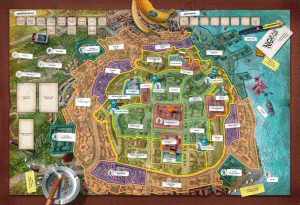Junta Review
on Oct 26, 2016
Negotiation games usually turn out one of two ways. Well, if you’re playing the classic Diplomacy, there’s a third way involving actual blood and police intervention, but the rest of them result in either fun and memories or a bland slog to the end, depending on your group. AEG’s Junta, originally released in 1978 and updated in 2015, gives two to seven players a healthy dose of gunboat diplomacy, dealmaking and a unique combat experience that perfectly captures the chaos of a coup.

Note bananas.
One player is elected el Presidente, who then distributes cabinet positions and foreign aid to the others, careful to strike a balance between rewarding them and ensuring they can’t grow too strong. Player votes determine election and budgetary outcomes, spending influence to sway the balance of power, and then things get more interesting. Assassins lurk everywhere, delivering death either by card or the Minister’s Death Squad if players choose their location poorly, because money in a Swiss bank account determines victory, but anything can happen on the way to the bank.
After the gun smoke clears and the bodies are carted away, the game round either ends peacefully or gets even more chaotic if a player starts a coup, switching Junta’s game modes and increasing both theme and play time. Rebels and loyalists take to the streets in this mini-wargame, maneuvering forces in an effort to control the majority of the capital’s critical locations by coup’s end, and in true revolutionary sense, each participant must pay attention to the ebb and flow of battle in order to ensure they’re on the winning side when the fighting ends, because with the exception of the president and the coup’s instigator, each player is free to switch loyalties at any time during the battle.
This is where the game gets interesting, forcing players to assess their chances of both affecting the coup’s outcome and being on the wrong end of a firing squad when it’s over. Since the “first rebelâ€, the one who started the revolution, can’t ask forgiveness, instigators must do the work before the students take to the streets to ensure the outcome as best they can. Get players to commit their troops to the cause, assassinate them to prevent their intervention, or convince them to stay home that day by other means, and the coup has a better chance of success. But like all classic negotiation games, handshake deals aren’t worth the paper they’re printed on, so every coup is full of uncertainty and tension. Or, like much of Junta overall, it might be full of those elements, depending on player count.
Two to seven players can partake, and Junta has the unique distinction of its play time being inversely related to player count because more players ramp up the uncertainty and chaos, which actually results in fewer attempted coups; players aren’t as willing to fire the first shot if they can’t be certain they won’t be the only one marching in opposition to el Presidente. So unless the player in control of the budget is blatantly short-changing everyone, the streets usually remain quiet and ruling families are content to count their money, and if rivals happen to occasionally get pushed in front of an oncoming bus or drown in their pool, well, such is life in la Republica de los Bananas.
Lower player counts drag out the game by having more information on the table, allowing better prediction of coup, budget and assassination outcomes. Two out of three players voting for the budget practically guarantee its passage. If your fellow plebe got shorted in the current budget, start a coup and the two of you will likely overwhelm el Presidente’s forces. Clarity robs Junta of its essence and fewer players provide more clarity, resulting in more coups and longer, more predictable games.

Note bananas.
In 1978, board games took a long time to play, and Junta’s revised edition clarifies some of its rules but doesn’t change its heritage. Giving a nod to the current desire for expedience in gameplay, the box states “120+ minutes†of play time, and while that’s certainly not a lie, it’s also not a normal play experience unless your group typically has the maximum number of players. A session with very few coup attempts may very well beat the box’s stated time, but a game full of urban warfare could easily double it, and that old-school variance may be off-putting to gamers who don’t have the time or group size to get an optimal Junta experience.
Like Dune, Diplomacy and Cosmic Encounter, Junta relies on players, not rules, to stop a runaway leader, so game groups that can’t tell which way the wind’s blowing will end up blown away. As an old-schooler, I prefer to have to keep the balance myself but Euro fans may view this as another strike against Junta. If so, that’s unfortunate, because Junta offers a compelling experience with the right group, recreating the swirling mess of timing, loyalty and self-preservation that leads to the events we see on international news. Find its sweet spot and it won’t disappoint.

 Customer Support
Customer Support  Subscribe
Subscribe 




 Account
Account  Wishlist
Wishlist 
